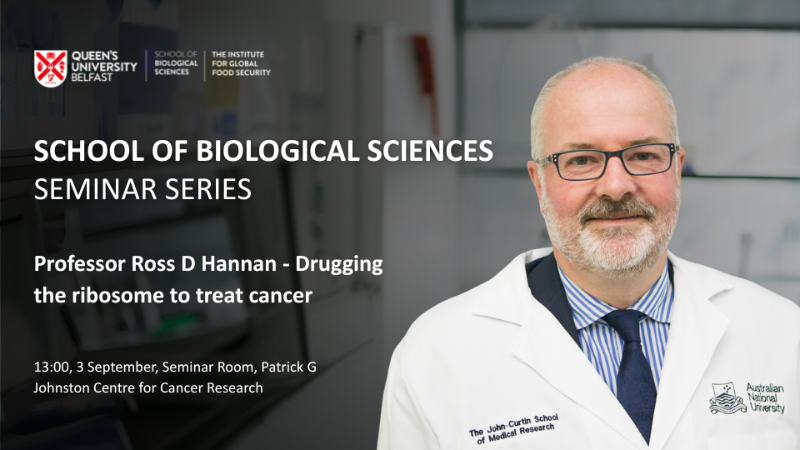We are pleased to welcome Professor Hannan, from the Australian National University (ANU), Canberra, Australia to the School to share his latest research in devising ‘first in class’ cancer therapies targeting the ribosome.
- Date(s)
- September 3, 2025
- Location
- Seminar Room, Patrick G Johnston Centre for Cancer Research
- Time
- 13:00 - 14:00
Professor Hannan’s career spans over 30 years of internationally competitive research in Australia and the US, during which he has published over 200 articles focusing on targeting ribosomal gene transcription to treat cancer and inherited blood disorders. His work has brought together multi-disciplinary teams of laboratory and clinician researchers and industry collaborators to devise ‘first in class’ cancer therapies targeting the ribosome. These drugs are now in phase 1 and 2 clinical trials for a range of human cancers. He graduated with a PhD in molecular Biology from the University of Tasmania in 1994 and undertook postdoctoral training in the USA at Penn State before returning to Australia in 1999 run his own research laboratory first at the Baker Medical Research Institute and then as Program Lead in the Peter MacCallum Cancer Center. In 2015 he was recruited to John Curtin School of Medical Research, ANU as the Centenary Chaired Professor in Cancer Biology where he founded the Department of Cancer Biology in Therapeutics. He is currently serving as Academic Lead, Health and Medicine at ANU. His contributions to medical research and executive health leadership have been recognized through his election as a Fellow of the Australian Academy of Health and Medical Sciences.
Abstract: Ribosome biogenesis (RiBi) is essential for cell growth and proliferation. Transcription of ribosomal RNA genes by Pol I is a critical step in RiBi and is tightly regulated by tumour suppressors and oncoproteins. Indeed, the ability of the potent oncoprotein, MYC, to drive RiBi is necessary for its oncogenic activity (Bywater et al., Cancer Cell, 2011). These data suggested that targeting RiBi, might be a promising strategy to treat malignancies driven by MYC. To test this we developed a series of selective second-generation Pol I inhibitors with our lead compound being PMR-116. PMR-116 selective inhibits Pol I by stalling the Pol I complex at the rDNA promoter. PMR-116, exhibits improved drug-like properties and pharmacokinetics compared to first generation CX-5461. As a single agent PMR-116 efficiently treats a range of pre-clinical models of solid and hematologic tumours including Lymphoma, AML, hepatocellular carcinoma and prostate cancer while sparing normal cells and tissue. MYC expression positively correlates with sensitivity to PMR-116 in human cancer cell lines and high MYC tumours in vivo are exceptionally sensitive PMR-116. Thus PMR-116 is promising new broad-spectrum anti-cancer drug particularly for those highly refractory tumours driven by MYC. We have recently completed a phase I clinical trial of PMR-116 (CTRN12620001146987) and are about to initiate a Phase 2 trial in patients with tumours driven by MYC.
- Department
- School of Biological Sciences
- Add to calendar

